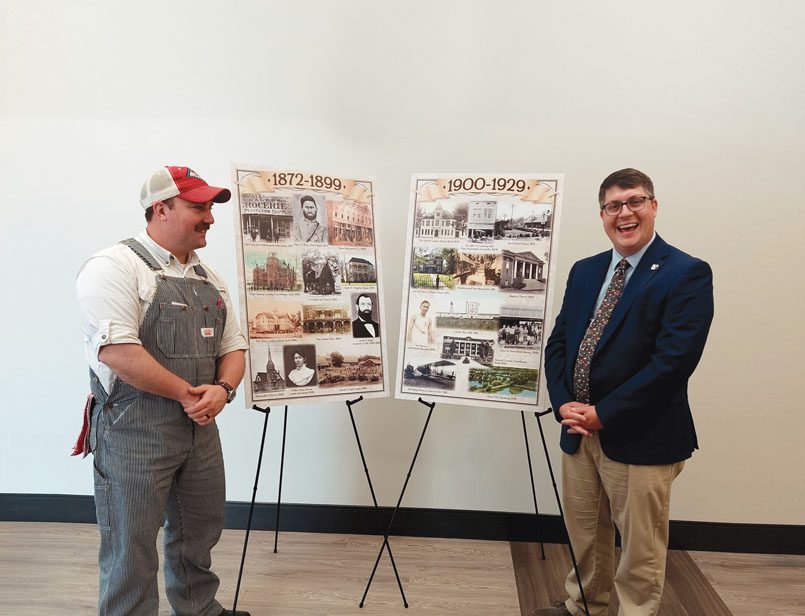31 May 2022 Lonoke’s Sesquicentennial: A Town Revived
Photo and story by Judy Riley
Locally called the “Front Porch of the Delta,” the town of Lonoke has a rich history and a promising future, according to speakers lauding the efforts of its citizens. The past, present, and future were celebrated Sunday, May 1. Lonoke was founded on Jan. 22, 1872, but the current city leaders chose to celebrate their sesquicentennial with other Central Arkansas communities and towns on “501 Day.” The event was held in the Lonoke Business Academy Auditorium, which is itself a testimony to the commitment of its citizens to Lonoke’s future. Built by local initiatives through a millage increase and several private donors, the facility is a job training center for Lonoke High School students in the fields of agriculture, medical, heating and air, and diesel mechanics.

Lonoke was named by pioneers in the railroad business. As plans were made and rails laid to connect Little Rock to Memphis in the 1800s, there needed to be a midpoint on the way. And in the midst of prairie grass as far as the eye could see, stood one lone oak tree. The name was shortened and the town became Lonoke. In the beginning, Lonoke became a stop, not officially a depot, but a great connecting town for the railroad. In deference to the railroad’s influence, the featured speaker at Sunday’s celebration was noted railroad author Michael Hibblen.
The coming of the railroad meant progress. Agriculture was the area’s only industry, and the railroad allowed farmers to transport their cotton to ports in Memphis and Little Rock. According to local historian Anna McClung, there were other reasons Lonoke thrived. In addition to the railroad and the agriculture produced, Lonoke was named the county seat. Local businesses and supporting professionals from lawyers to restaurants to churches to homes were added. Education was important. The town once housed a Women’s Finishing School, which included grades one through 12.
As time went on, Lonoke became more of a bedroom community, without the many businesses formerly thriving there. But the citizens of Lonoke did not want their community to fall the way of many small towns in the Delta. In 2017, the city was one of five small towns receiving a business and economic development grant through the Community Development Institute, housed on the UCA campus.
Other resource groups enlisted included the Winrock Foundation, the U of A Division of Agriculture Cooperative Extension Service and U of A for Medical Sciences. More importantly, impassioned volunteers got involved. They conducted focus groups to identify their assets and went through an extensive process to develop a plan to revitalize the town. The effort became “Kick Start Lonoke,” and the words of Governor Asa Hutchinson are ringing true, “Lonoke has a culture of opportunity; this is Lonoke’s time.”
What makes Lonoke so special? According to Mayor Trae Reed, it is a community with a commitment. He is a current Air Force C-130 pilot and married a Lonoke girl. Together, they want to raise their family in this quiet, yet progressive town. According to his wife, they want a place where they can “do good on a small scale.”
The mayor is quick to give credit to the real pusher behind the revitalizing effort, Ryan Biles, city councilman and local architect. The lineup of speakers at Sunday’s celebration was a “who’s who” of local dignitaries. In closing statements, Biles acknowledged members of the team, praising their efforts and concluding with, “We have progress and potential when communities come together.” And just like the trains that once influenced the beginning of Lonoke, the “train of volunteers” will bring a new beginning of progress and growth to this small town. Will history repeat itself in Lonoke. The answer is a resounding yes!”
But long before the current revitalizing efforts, a collection of volunteers were sowing seeds of dedication and pride in Lonoke’s rich history. Under the leadership of Sherryl Miller, they quietly secured funds to create the Lonoke Museum housed in a donated old car dealership building.
Without the aid of city or county funds, they support the effort to maintain 12 different storefronts depicting old businesses by selling books about Lonoke’s history. They recently published a collection of pictures and history of Lonoke’s former businesses as part of the sesquicentennial celebration. Copies of the book, “150 Years Celebration of the City of Lonoke, Arkansas 1872 – 2022,” are available by contacting Sherryl Miller at [email protected] or by calling the museum at 501.676.6750. Keep up with interviews and their latest projects on The Lonoke County Museum Facebook page. This is an example of townspeople working together to forge their own future.








